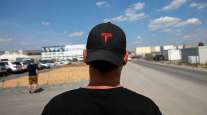A $290,000 Robot-Car Is French Startup’s Answer to GM, Waymo

Navya Technologies SAS will roll its robot-driven automobiles onto the cobbled streets of Paris in the next few weeks to try and beat behemoths from General Motors Co. to Alphabet Inc. at proving autonomous cars are safe.
The French startup’s 15-seater driverless shuttles have been dodging bankers and corporate executives in the capital’s business district of La Defense since July. Now, the company backed by investors including car-parts maker Valeo SA, is manufacturing a smaller SUV to seat 6, that will start selling for some 250,000 euros ($290,000) in about a year. It unveiled prototypes of the so-called “robotaxi” in Paris Nov. 7.
Navya is extending its strategy of designing both the vehicles and their software from scratch and in-house, in a bid to bring a finished fully-autonomous vehicle to market faster than a crowd of rivals.
RELATED: Alphabet launches the first taxi service with no human drivers
RELATED: First self-driving shuttle on public roads to launch in Las Vegas
“We’re the first to conceive and manufacture a vehicle that is made to be fully autonomous, instead of adapting an existing car,” Navya CEO Christophe Sapet said in an interview. “We want to be the first company to offer a full comprehensive line-up of autonomous vehicles.”
GM has a car-sharing business called Maven and its Cruise Automation unit’s tests on autonomous vehicles have helped drive investor expectations that the automaker has two essential ingredients to set up a lucrative robotaxi operation. Waymo, the self-driving car unit of Alphabet Inc., has bet on buying vehicles from Fiat Chrysler Automobiles NV and implementing its technology into autos manufactured by others.
More broadly, venturing into the car business can be a very costly adventure: Dyson Ltd., best-known as a manufacturer of vacuum cleaners, is pumping 2 billion pounds ($2.7 billion) into developing an electric car by 2020, which isn’t even driverless. The company has 400 engineers dedicated to the project. Navya’s means are a fraction of that at Dyson’s disposal.
City Experiments
Navya’s new cabs, priced between 230,000 euros and 250,000 euros and with a top speed of about 80 kilometers (50 miles) per hour, will be tested in the streets of Paris in a few weeks and start selling from the third quarter of 2018, Sapet said. The first experiments will be conducted with French transport operator Keolis SA and the Royal Automobile Club of Australia, which in total have pre-ordered about 30 cars, he said.
Potential customers range from ride-hailing operators like Uber Technologies Inc. to car rental platforms like Hertz Corp. and Avis Budget Group, Sapet said. Tech companies like Apple Inc. or even the automakers themselves, such as Renault SA or Volkswagen AG, are also on Sapet’s target list.
The challenge for Navya is that many of those potential buyers already have their own plans to develop autonomous vehicles. Separately, experiences from companies including Tesla Inc. have shown making the driverless car a reality is complicated. Rival self-driving startup NuTonomy Inc. last month was snatched up by car-parts maker Delphi Automotive Plc for $450 million.
So far Navya’s earlier launch into minibus shuttles is on track — it invested in a production plant in Michigan and set a target to sell 450 units of its bigger minibus shuttles by the end of next year, a third of which in the U.S. — giving the company some arguments when it pitches to investors. After raising 30 million euros last year from backers including Valeo, the company will need to raise more money to make its latest vehicle, Sapet said.





